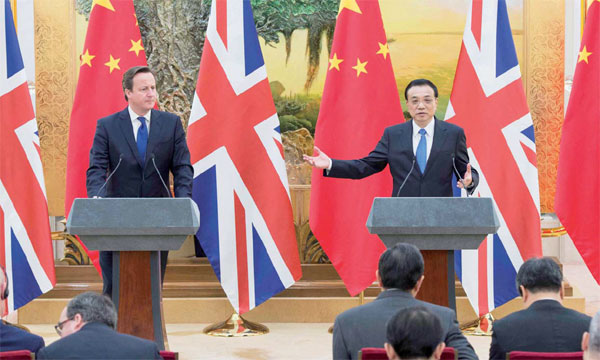Visits to Beijing bring about bonanza
Updated: 2014-06-13 07:53
By Cecily Liu and Zhang Chunyan (China Daily Europe)
|
|||||||||||
|
Premier Li Keqiang and British Prime Minister David Cameron meet with journalists on Dec 2 in Beijing. Wang Ye / Xinhua |
UK and China harvest fruit from seeds planted last year
High-level visits to China by British government leaders toward the end of 2013 have led to significant growth in China-UK cooperation in sectors including infrastructure, energy, financial services and healthcare.
The most high profile visit was led by British Prime Minister David Cameron in December, attended by more than 100 UK business leaders.
Also visiting around the same time were UK Chancellor George Osborne, Secretary of State for Energy and Climate Change Ed Davey, Secretary of State for Transport Patrick McLoughlin and former health minister Ken Clarke. Each had a separate agenda.
The visits have played a big role in advancing China-UK cooperation in nuclear energy and growing offshore yuan activities in London, both areas that require strong government support.
During Osborne's China trip in October, he announced that the British government would give the go ahead to Chinese companies taking a stake, including potential future majority stakes, in Britain's nuclear power stations.
Symbolically, he made the announcement at South China's Taishan nuclear power station, which is a partnership between French energy company EDF and the China General Nuclear Power Company.
Shortly afterward, two Chinese nuclear power companies reached an agreement to invest in the UK's first nuclear power stations for two decades, a milestone move which will demonstrate the strength of the Chinese nuclear industry in Western countries.
The two planned reactors are at Hinkley Point C, in Somerset. Led by EDF Group, they will cost 14 billion pounds ($23.5 billion, 17 billion euros), and are expected to start operating in 2023 and run for 35 years.
China General Nuclear Power Group and China National Nuclear Corp are expected to have a combined 30 to 40 percent stake in the consortium, with Areva taking another 10 percent. Exact plans are expected later this year after a European Commission decision on UK state aid for the project is made.
Aijuan Wang, a director with UK-based consultancy Mott MacDonald, said Chinese nuclear companies could learn valuable lessons by participating in a project such as Hinkley Point C as minority investors, and this experience will help to equip them to tackle future UK nuclear projects, perhaps as majority investors.
"The nuclear industry regulations and technical standards in each country are different. Chinese companies have not gained sufficient knowledge yet of how the UK regulatory system works, but they will learn if investment deals such as Hinkley Point C go ahead. It's only a matter of time," Wang said.
On the financial services side, Osborne has welcomed Chinese banks to apply for branch licenses in London. His visit took place at the same time as a regulatory change that would enable foreign banks to set up branches.
Previously, most international banks were only allowed to set up subsidiaries, which are subject to the strict capital requirements that apply to Britain's local banks, hence the lending and financing capacity is proportional to the balance sheet of the subsidiary itself. The exceptions were banks from the European Economic Area and the United States.
Branches, in contrast, have a lending and financing capacity proportional to their parent company's balance sheet and are thus able to provide Chinese companies significantly greater lending and financing services.
A source close to the negotiations said that several Chinese banks have already applied for branch licenses and approval is expected.
"The British side has shown sincerity and then pushed for progress," the source said, adding that both sides are eager to continue the process. The plan is beneficial for both China and the UK, given that London is the largest foreign exchange market, the source said.
To help London grow offshore yuan activities, the Chinese government provided an 80 billion yuan ($13 billion, 7.7 billion euros) RQFII quota during Osborne's visit.
RQFII, which stands for Renminbi Qualified Foreign Institutional Investors, is a program launched by the Chinese government in 2011 that allows qualified overseas financial institutional investors from overseas to invest in China's onshore financial markets directly using the renminbi.
Building on last year's agreement to work together in growing offshore yuan activities in London, a memorandum of understanding was reached in April to appoint a yuan clearing bank. Such a bank should be appointed in London in June, according to Mark Boleat, policy chairman for the City of London Corp.
Another key topic during visits by both Osborne and Cameron was the development of the Shanghai Free Trade Zone as a way to help China achieve financial liberalization.
China launched the 29-square-kilometer Shanghai FTZ in September to help facilitate the country's economic and financial liberalization. Examples of reforms include liberalization of currency, interest rates and commodity trading. Successful reform policies tested in the Shanghai FTZ will be implemented across the country.
The two governments looked at how British expertise can help China develop FTZ policy, and Britain subsequently established an International Experts Consultation Group. Led by Gerry Grimstone, chairman of TheCityUK, the group consists of around 50 international firms across different sectors.
Grimstone said the group's plan is initially to produce a series of short policy papers, with each focusing on a specific topic. The first three policy papers have been finalized.
The policy papers will be disseminated amongst Chinese policymakers, to be followed up by a series of face-to-face dialogues.
During Davey's China visit, he signed a memorandum of understanding on offshore wind power with Wu Xinxiong, head of China's National Energy Administration, the first of its kind that China has signed with another country.
As a direct follow up from the memorandum, the UK charity Carbon Trust produced a series of reports in May examining how UK expertise could help China's offshore wind energy sector in areas such as site selection, designing incentive systems, and technology and supply chain development.
"China has abundant resources in offshore wind, but the challenge is to reduce its costs. Offshore wind in China is not just about China, but for China to become an exporter," said Tom Daley, chief executive of Carbon Trust.
Li and Cameron also agreed in December on a 200-million-pound research fund aiming to foster scientific collaboration. Priorities are being defined for the project, which is a joint effort of the UK's Technology Strategy Board and China's Ministry of Science and Technology.
The priorities are expected to be finalized and announced soon, after which UK and Chinese partners can apply for funding as a group.
It is expected that money will be available for the UK partners to train Chinese partners in innovation, intellectual property management and other skills that would not just help China upgrade technology but also manage the technology infrastructure, said Chris Rudd, a pro vice chancellor at the University of Nottingham.
Another agreement reached by the two governments deals with Chinese investment in the UK infrastructure sector. One deal announced to coincide with Osborne's China visit was the investment of Beijing Construction Engineering Group in the 800-million-pound Manchester Airport City project. BCEG will share 50 percent of the project's construction.
However, some sectors discussed by the two governments last year have progressed more slowly. One example is the interest China has expressed in investing in the UK's high speed railway. No Chinese company has come forward with any concrete investment proposals.
Another area that many industry experts feel has been lacking is the UK's efforts to implement an easier visa application process for Chinese visitors.
Although Cameron announced during his China trip same-day visa service for business visitors from China to the UK, many experts feel more should be done to synchronize the UK and Schengen visa applications. The Schengen Area is comprised of European countries that have removed controls between their common borders. The UK has opted out.
"It would be very efficient if there is mutual recognition of visas between the UK and Schengen countries. I don't think that will happen in the short term, but all I'd like to see is for things to be made easier for our customers," said Willie Walsh, CEO of British Airways.
Contact the writers through cecily.liu@chinadaily.com.cn
(China Daily European Weekly 06/13/2014 page8)
Today's Top News
China finds way to play in 2014 World Cup
Protocol targets sex violence
Premier all business on Europe trip
Poland-China train on maiden trip
Iraq facing 'mortal threat' from militants
China, Italy boost ties
Brazil averts strike before WCup
Red meat 'linked to cancer'
Hot Topics
Lunar probe , China growth forecasts, Emission rules get tougher, China seen through 'colored lens', International board,
Editor's Picks

|

|

|

|

|

|






